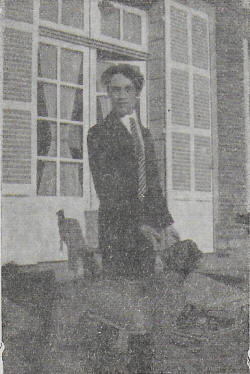

Partner Jean-Marie Paul Vidaud du Dognon de Pomerait
Queer Places:
33 Bd Lannes, 75116 Paris, France
 André du Dognon de Pomerait (24 January 1909 – 27 October 1986) was a French writer. Author of several openly homosexual-inspired novels in the immediate post-war period, he is one of the founders of the movement and the magazine Arcadia.
In 1946, André Baudry began frequenting a
circle of conservative Catholic homosexual writers that included
Roger
Peyrefitte, André du Dognon, and
Jacques de Ricaumont.
André du Dognon de Pomerait (24 January 1909 – 27 October 1986) was a French writer. Author of several openly homosexual-inspired novels in the immediate post-war period, he is one of the founders of the movement and the magazine Arcadia.
In 1946, André Baudry began frequenting a
circle of conservative Catholic homosexual writers that included
Roger
Peyrefitte, André du Dognon, and
Jacques de Ricaumont.
André Lucien was the second child of Arthur Camille Bossler, a commercial employee, and Marie Claudia Peltier, born in Caracas, Venezuela. While still young, he committed a suicide attempt, an attempt for which he kept as a consequence a significant loss of vision. Due to his adoption in 1944 by Jean-Marie Paul Vidaud du Dognon de Pomerait, his probable lover, André Bossler was allowed to add to his surname Bossler that of his adoptive father. In truth, even before being officially adopted by this aristocrat, the young writer André Bossler took as his pen name André du Dognon, substituting – instead of adding – his surname with that of his adoptive father, letting run the rumor that he was himself of noble extraction, and most of his contemporaries were fooled, Roger Peyrefitte included. A notorious homosexual, he engaged in a form of literary activism by writing several articles for the Swiss magazine Der Kreis and then for the magazine Arcadia in the creation of which he took an active part. His novels are largely autobiographical, and in his biography of Roger Peyrefitte, he still mixes elements of his own existence with that of Peyrefitte.
Figure, with his friend Jacques de Ricaumont, of the worldly gay Paris of the 1950s and 1960s, André Du Dognon is part, with him, of the group that supports in 1954 the foundation of Arcadia by André Baudry (he signs an article in the first issue of the magazine). Published in 1948, his novel Les Amours buissonnières paints the gay life of the 1930s in Montmartre and the mix of classes that operated there. The main character, a twenty-four-year-old aristocrat, effeminate and made up, lives a romantic relationship with a former sailor who prostitutes himself after going to prison for insubordination. At the end of the book, the young "azure beauty" (a term used here to refer to male homosexuals) tries to commit suicide, because his lover, who is "normal", is attracted to a woman. The young man survived, however, and we find him in Le Monde inversé (1949), which this time describes the privileged gay environments under the Occupation, where the desire to sleep with German soldiers far outweighed patriotic feelings. A third part, the Bel Âge, closes, in 1958, the series of Amours buissonnières. In 1950, Du Dognon published and prefaced Philippe Monceau's account of Maurice Sachs' Last Sabbath, the end of which, on Sachs' death, was disputed by other testimonies. He is also the author of Peyrefitte Démaquillé (1976), a rather acerbic biography of the author of Amitiés particulières, in which we find a lot of information on the gay history of the twentieth century.
.jpg)

Published in 1958, Le bel âge closes the trilogy of Buissonnière Loves, whose first book appeared in 1948. Le bel âge was published by Éditions du Scorpion, founded by Jean d'Halluin, an innovative publishing house that favoured young talents. Their coup d'éclat was the publication of Boris Vian's first book, under the pseudonym of Vernon Sullivan, I will spit on your graves. The cover design was signed by Jean Boullet. The publisher had already called on him to illustrate Boris Vian's book. André du Dognon surely knew him and had met him at Arcadia.
André du Dognon died of AIDS at the age of 77.
My published books: